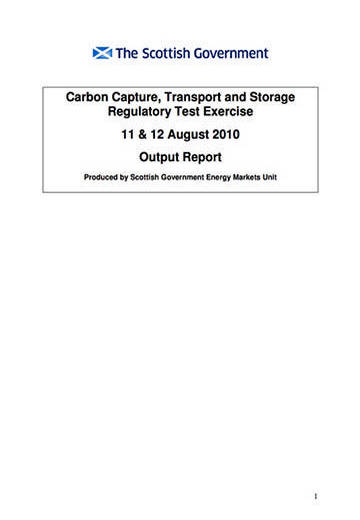Publications
Carbon, capture, transport and storage regulatory test exercise: 11 & 12 August 2010. Output report
12th August 2010
Topic(s): Carbon capture use and storage (CCUS), Policy law and regulation
From April to August 2010, the Scottish Government coordinated a scenario project to assess the regulatory framework for carbon capture and storage (CCS) in Scotland. The principal objective of the project was to identify any regulatory gaps or overlaps that could be streamlined or better managed, and to evaluate the risks, barriers, information gaps and any other issues that would affect the successful demonstration and deployment of CCS in Scotland.
The project comprised the following components:
- An illustrative CCS project application to cover full chain, capture, transport, storage and decommissioning – based on a coal-fired plant, post-combustion capture, onshore pipeline transport, with storage in the North Sea;
- Consideration of the project application in a live process exercise involving all of the major stakeholders in a two day workshop (developers, regulators[1], government, NGOs, public interest groups);
- Cradle to grave assessment of the whole project for the full raft of 56 consents/licenses required.
- External peer review assessment and critique of the process by observers from the Global CCS Institute and EU Zero Emissions Technology Platform (ZEP).
Key findings of the process:
- Full chain CCS projects are some of the largest infrastructure projects ever considered in Scotland with some of the greatest amounts of public funding;
- These are complex projects involving multiple interest groups and a range of overlapping regulatory regimes;
- The regulatory framework for CCS is emerging well in the UK, with regulators taking a positive, enabling approach to CCS projects, whilst protecting the environment and human health;
- Aspects of CCS regulation are still emerging, particularly offshore, where there is greatest uncertainty for developers, and regulators and developers will 'learn by doing';
- Some remaining technological issues need to be addressed before regulators can be certain, but projects are underway to address these gaps;
- Environment agencies could permit a good application now within the existing regulatory framework which is generally fit-for-purpose
- Co-operation and joint working across Government departments and regulators will be essential to ensuring effective management of CCS regulation within the demanding timescales required by the UK and EU CCS competitions;
- Regulators could also look at procedures to improve the way in which environmental information is made available as part of the licensing/consenting process; and at ways to better inform the public about the whole chain of a CCS project and the many consents and consultations associated with this.
- Early discussions with stakeholders are key to streamlining the regulatory process in all parts of the CCS chain
- Public awareness/engagement is the key issue that will determine the overall success of CCS projects.
Overall conclusions
From this, participants concluded that the CCS demonstration programmes planned at UK and EU level would be the primary vehicle for testing and refinement of the regulatory approach and for effective public engagement. Ensuring that this was a key feature of the demonstration projects was as important as them assessing the economic and technical viability of CCS and will be a key part of the knowledge exchange and learning to be made available in the demonstration programmes.
It is clear that all of the early enablers (developers, regulators, governments, NGOs, academics) have a big responsibility in ensuring the successful demonstration of CCS. Much of the learning around CCS – on the regulatory aspects as well as on the technical and economic ones will come through engagement with the actual project applications coming forward under the demonstration programme.
Overall, given the complexity and size of the CCS projects and the large numbers of permits required, the process showed that effective management of the regulatory framework would be crucial to the success of the demonstration programme in the UK and EU. There is general support amongst participants (developers, regulators, NGOs, government) for managing project applications collectively through some form of project monitoring board that can consider the collective time management of all of the permits in the round.
[1] Department for Energy and Climate Change (DECC) Offshore, The Crown Estate, Marine Scotland, the Scottish Government Energy Consents Unit, the Scottish Environment Protection Agency (SEPA), the Health & Safety Executive (HSE) and Scottish Natural Heritage (SNH))
Disclaimer
The content within the Global CCS Institute Publications, Reports and Research Library is provided for information purposes only. We make every effort and take reasonable care to keep the content of this section up-to-date and error-free. However, we make no claim as to its accuracy, currency or reliability.
Content and material featured within this section of our website includes reports and research published by third parties. The content and material may include opinions and recommendations of third parties that do not reflect those held by the Global CCS Institute.
